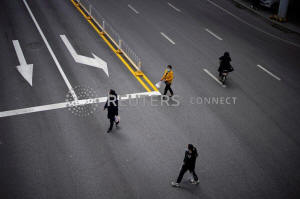China tightens Russia border checks, approves coronavirus vaccine trials
 Send a link to a friend
Send a link to a friend
 [April 14, 2020]
By Yew Lun Tian and Huizhong Wu [April 14, 2020]
By Yew Lun Tian and Huizhong Wu
SUIFENHE, China (Reuters) - China has
approved early-stage human tests of two experimental vaccines to combat
the new coronavirus as the country where the virus was first detected
battles to contain imported cases, especially from Russia.
Russia has become China's largest source of imported cases, with a total
of 409 infections originating in its northern neighbour. Chinese there
should stay put and not return home, the state-owned Global Times said
on Tuesday.
"Chinese people have watched Russia become a severely affected
country...This should sound the alarm: China must strictly prevent the
inflow of cases and avoid a second outbreak," the paper, which is run by
the Communist Party's People's Daily, said in an editorial.
China's northeastern border province of Heilongjiang saw 79 new cases of
imported coronavirus cases on Monday, all Chinese citizens travelling
home from Russia, state media said. Mainland China reported 89 new
cases.

Heilongjiang's provincial authority said on Tuesday it had established a
hotline to reward citizens as much as 5,000 yuan ($710) for handing over
or reporting illegal immigrants.
China has reported 82,249 coronavirus cases and 3,341 deaths. It
reported no new deaths on Tuesday. Mongolia also confirmed 13 new cases,
all imported from Russia.
VACCINE TRIALS
As China fights to prevent a second wave of coronavirus infections, two
experimental vaccines will be tested on humans, the Xinhua state news
agency reported.
They are being developed by a Beijing-based unit of Nasdaq-listed
Sinovac Biotech <SVA.O> and by the Wuhan Institute of Biological
Products, an affiliate of state-owned China National Pharmaceutical
Group.
In March, China gave the green light for another clinical trial for a
vaccine candidate developed by China's military-backed Academy of
Military Medical Sciences and Hong Kong-listed biotech firm CanSino Bio
<6185.HK>.
U.S. drug developer Moderna <MRNA.O> said earlier it had begun human
tests of its possible vaccine with the U.S. National Institutes of
Health.
But despite hopes for a vaccine, the epidemic could stretch on for up to
two years and precautions such as masks and preventing big gatherings
may need to continue, Zhang Boli, president of the Tianjin University of
Traditional Chinese Medicine, told reporters.
"We have to make preparations for the long term," he said.
MORE RESOURCES
China's coronavirus task force decided on Monday to boost health
resources at its borders. It will build hospitals and establish
isolation points near borders and also strengthen cooperation with
neighbours.
However, officials acknowledged that China's long border with numerous
country roads, paths, ferry crossings and mountain passes made it
difficult to control.
[to top of second column]
|

People wearing face masks cross a road after the lockdown against
the coronavirus disease (COVID-19) was lifted in Wuhan, Hubei
province, China April 14, 2020. REUTERS/Aly Song

Foreign Ministry spokesman Zhao Lijian said on Tuesday that
authorities on both sides of the border should collectively take
measures against illegal crossing.
"This responsibility must be shouldered by both sides to uphold
order in the border area," he said, adding that there are about
100,000 Chinese nationals in Russia.
To ensure no infected people slip in from Russia, China has put in
stringent measures in Suifenhe, a city in Heilongjiang with a
checkpoint into Russia. Train services from it have been reduced and
cars need a special pass to leave.
Piao Minghua, deputy head of customs in the area, told Reuters that
everyone entering Suifenhe had to be tested for the coronavirus,
give details of contacts and undergo quarantine.
Residents are only allowed to leave their homes once every three
days, many shops are closed and markets largely deserted.
Suifenhe has also converted an office building into a hospital that
would provide 600 beds for patients.
"The temporary hospital is a back-up plan and, if needed, it will
immediately go into operation," acting mayor Wang Yongping was
quoted by Xinhua as saying.
SYNERGY
Though the northeast border remains China's priority, state media
said more than 100 people had been arrested in March for illegally
entering China through its southwestern border in Yunnan province.
Thousands of people, mostly Chinese workers and traders, were
flooding back into Yunnan from Laos and Myanmar this month.

Chinese Premier Li Keqiang urged Asian countries to work more
closely in the fight against coronavirus, Xinhua said.
"The battle against COVID-19 has made us more aware that we are in a
community with a shared future," Li told a video summit on Tuesday
attended by Southeast Asian countries, Japan and South Korea.
(Reporting by Yew Lun Tian and Huizhong Wu in Suifenhe, Lusha Zhang
in Beijing; Additional reporting by Tom Balmforth in Moscow, Emily
Chow in Shanghai, and Anand Tumurtogoo in Ulaanbaatar; Writing by
Andrew Galbraith; Editing by Angus MacSwan)
[© 2020 Thomson Reuters. All rights
reserved.] Copyright 2020 Reuters. All rights reserved. This material may not be published,
broadcast, rewritten or redistributed.
Thompson Reuters is solely responsible for this content. |